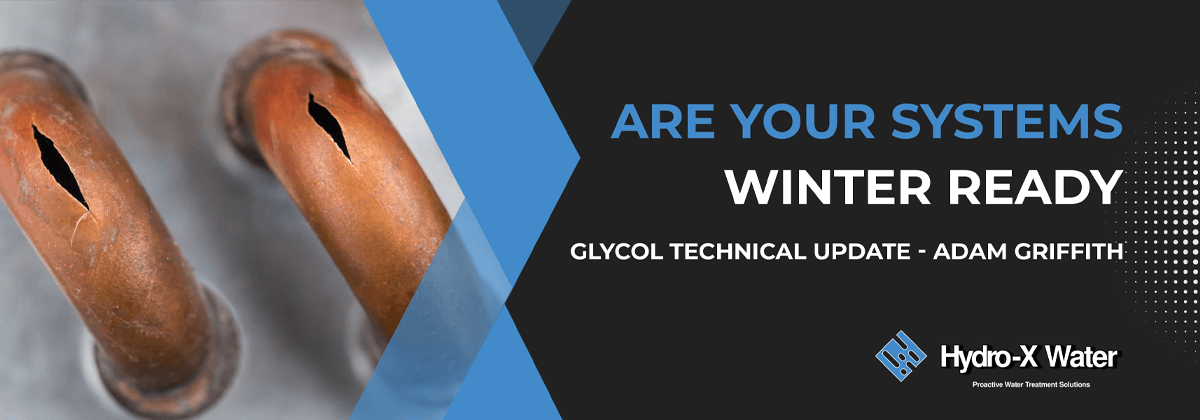
Are your Systems Winter Ready
Glycol Technical Update From Adam Griffith
Anti-Freeze – Effective use of Glycols
The effective use of glycols in winter is critical for chilled water systems. Choosing the right type of glycol, achieving the correct concentration, and implementing proper monitoring and maintenance controls are essential steps in ensuring both freeze protection and microbiological control. By carefully considering these factors, sites can optimise glycol usage, protect their water systems, and maintain uninterrupted operational efficiency during the winter months.
Glycol can serve a dual purpose in chilled water systems during winter. Firstly, they act as an antifreeze, preventing water from freezing and causing damage to pipes, equipment, and processes. Secondly, glycols, when dosed to sufficient levels, exhibit biostatic properties, inhibiting the growth of microorganism’s systems. This biostatic nature is crucial for maintaining the integrity of chilled water processes and avoiding issues related to microbial contamination.
Two primary types of glycols, mono-ethylene glycol (MEG) and Mono-propylene glycol (MPG), are commonly used in water treatment. While both offer effective antifreeze properties, propylene glycol is preferred in applications where there is potential for incidental contact with food, as it is less toxic than ethylene glycol. Careful consideration should be given to the specific requirements of the site when selecting the appropriate glycol type.
Achieving the correct glycol concentration is critical to ensure adequate freeze protection and biostatic control. The concentration is typically expressed as a percentage of glycol in the water mixture. Typically, in the UK the acceptable level of glycol is between 20-25%, this will provide freeze protection down to around -8°C to -10°C range with some small differentiation between MEG & PEG, site specific requirements should be considered when determining desired protection.
|
% Glcol By mass |
MEG Freezing Point °C |
MPG Freezing Point °C |
|
15 20 25 30 |
-5.4 -7.8 -10.7 -14.1 |
-5.1 -7.1 -9.6 -12.7 |
Underdosing of glycol can lead to insufficient freeze protection, risking damage to the water system during extreme cold conditions. On the other hand, overdosing may result in unnecessary costs and potential negative effects on system performance like higher power usage of circulation pumps. Striking the right balance is crucial, and regular monitoring of glycol concentrations is recommended to ensure ongoing effectiveness.
To maintain the desired glycol concentration, regular monitoring and maintenance practices are essential. Routine testing of glycol levels, pH, and wider system conditions can help identify any deviations from the control parameters and allow timely reactive works to be completed to ensure your chilled water systems perform during the harsher winter months.
Mitigate high unbudgeted costs and plant downtime this winter. Get in touch with our expert team to ensure you have sufficient Glycol for your systems.
Call 01909 565133 or email info@hydro-x.co.uk

Adam Griffith – Technical Manager




